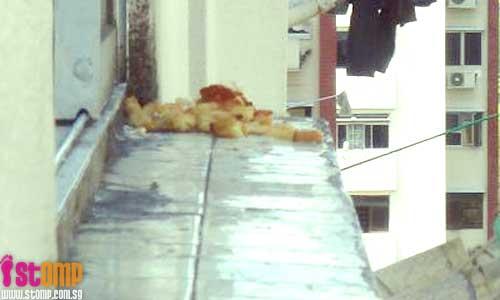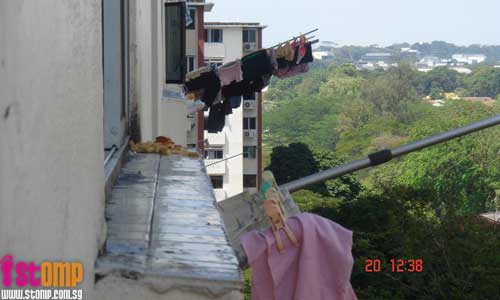
STOMPer Dexter's inconsiderate neighbours leave food for birds on their window ledge all the time.
According to this STOMPer, the birds defecate on his clothes and in his house.
A frustrated Dexter says:
"I have made multiple complaints to the Town Council about my neighbours feeding birds almost everyday.
"They leave a huge handful of food for the birds, but nothing has been done about this till now.
"Birds would come and leave their waste on my clothes or in my house .
"I hope the Town Council can look into this problem. The address is Block 170 Stirling Road"

Related post: Uncle feeds pigeons despite 'No Feeding' sign at Bencoolen Street (22nd January 2009)
Crazy pigeon is not afraid of people and steals food from their plates (23rd January 2009)
Bird droppings everywhere because of too many pigeons (29th January 2009)
As most of us know, living in densely populated Singapore means that one often has to put up with a lot of undesirable behaviour from neighbours. Although the person feeding birds in such a manner might consider it an act of goodwill, it does certainly create a lot of inconveniences and hazards for others living in the vicinity. This post over at the Bird Ecology Study Group presents a writer's perspective on the feeding of birds.
In such a scenario, the birds most likely to be attracted to such offerings of food would be our very common urban species, such as house crow (Corvus splendens), feral pigeon (Columba livia), Javan mynah (Acridotheres javanicus), common mynah (Acridotheres tristis) and Eurasian tree sparrow (Passer montanus). There are health risks involved, due to the increased number of bird droppings, the decomposition of any uneaten food, and the insects that would undoubtedly also be drawn to the area. Besides, I have my doubts as to whether feeding scraps and leftovers is good for the birds' health in the long term.
I do wonder about the ecological consequences of such behaviour. These common urban species appear to be extremely successful, to the point where I'm sure that other bird species are negatively impacted. Deliberate feeding might further increase the populations of these birds, and lead to other species of birds being competitively excluded. In my neighbourhood, where there are very healthy populations of these five species, other species of birds are quite uncommonly encountered. Whether it's through direct competition for food and nest sites, predation, or more insidious means such as transmission of diseases and parasites, these commensals have overwhelmingly dominated the urban ecosystem.
It is interesting to note that while many other countries have a culture of installing bird feeders, nest boxes, and bird baths, such practices, if carried out in Singapore, would almost certainly be frowned upon, and in reality would largely benefit only the small handful of already common urban species.